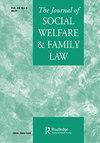谁的程序公平?
IF 0.9
Q2 LAW
引用次数: 0
摘要
本文章由计算机程序翻译,如有差异,请以英文原文为准。
Whose procedural fairness?
ABSTRACT Thought on procedural fairness in administrative justice has traditionally focused on the relationship between public decision-makers and the person or group formally subject to the decision-making process. Yet, people who are not the direct subject of such processes but are, in various ways, able to access the experiences of others can also have salient and consequential experiences of procedural fairness. This article demonstrates empirically this phenomenon, which we label ‘vicarious administrative fairness’, and observes that it is vital to developing a fuller understanding of the sociology of administrative justice. In turn, this richer sociological understanding raises new questions about if and how institutions, including the law itself, ought to respond to it – not least as it calls into question the default, individualistic unit of analysis underpinning conventional thinking.
求助全文
通过发布文献求助,成功后即可免费获取论文全文。
去求助
来源期刊
CiteScore
2.00
自引率
13.30%
发文量
52
期刊介绍:
The Journal of Social Welfare & Family Law is concerned with social and family law and policy in a UK, European and international context. The policy of the Editors and of the Editorial Board is to provide an interdisciplinary forum to which academics and professionals working in the social welfare and related fields may turn for guidance, comment and informed debate. Features: •Articles •Cases •European Section •Current Development •Ombudsman"s Section •Book Reviews

 求助内容:
求助内容: 应助结果提醒方式:
应助结果提醒方式:


